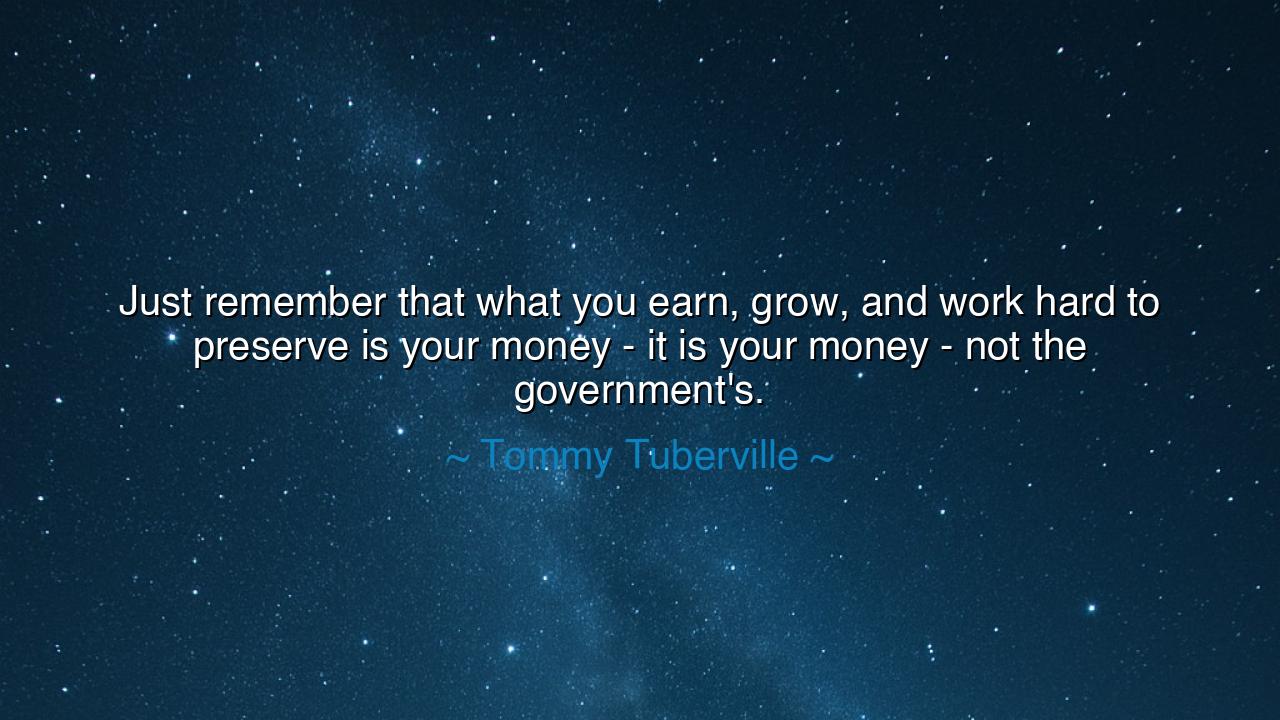
Just remember that what you earn, grow, and work hard to preserve
Just remember that what you earn, grow, and work hard to preserve is your money - it is your money - not the government's.






In the rolling rhythm of freedom’s story, where nations rise on the labor of their people, there rings a voice both fierce and simple—Tommy Tuberville, speaking a truth as old as toil itself: “Just remember that what you earn, grow, and work hard to preserve is your money—it is your money—not the government’s.” These words are not merely about wealth; they are about ownership, dignity, and the sacred bond between a person’s labor and their liberty. They remind us that what a man or woman earns through sweat and struggle is not merely coin, but the reflection of their effort, their independence, and their very soul.
The ancients knew this truth well. In the time of the Romans, there was a saying: “The fruit of a man’s labor is his freedom.” When free citizens lost the right to keep the rewards of their work, they became not men of the Republic, but servants of the State. So too does Tuberville’s declaration stand as a defense of that ancient covenant—that the purpose of government is not to own the citizen, but to protect him; not to take from him what is rightfully his, but to guard his ability to earn, to build, to flourish. For when a person’s wages are treated as the property of the state, the line between free nation and feudal rule begins to fade.
The words find their modern root in the great debates of taxation and government power, echoing across the halls of democracy since its earliest days. The founders of America, in their time, spoke against the tyranny of taxation without representation, and their cry—“No taxation without representation!”—was not only about numbers and rates, but about ownership of the fruits of one’s labor. They believed that each citizen should have a rightful claim to what they produced, for in that right lay the essence of liberty. The revolution they kindled was as much economic as political: a struggle for the dignity of work, the sovereignty of the individual, and the rejection of arbitrary authority over personal wealth.
Yet the truth Tuberville speaks is not one of selfishness, but of stewardship. When he says, “It is your money, not the government’s,” he reminds us that freedom is inseparable from responsibility. What you earn is yours—but it is also yours to use with wisdom. The wise man of old did not hoard his grain while his village starved; he shared by choice, not by compulsion. True generosity is born of voluntary giving, not forced redistribution. For charity commanded is no charity at all—it is the shadow of virtue without its light.
Consider, then, the story of the American farmer—a man who rises before dawn, his hands roughened by the plow, his eyes fixed on the uncertain sky. He works the land not for fame nor comfort, but for the quiet pride of earning by his own strength. Each harvest, he pays his dues to the state, as all citizens must, yet he knows that the balance must be kept. When the state forgets that it exists to serve him, when it demands more than fairness allows, when it takes from him not to protect but to rule, then the spirit of freedom begins to die. His crops, his sweat, his profit—these are not gifts of the government. They are the rightful rewards of his labor, sanctified by effort and endurance.
Tuberville’s words, then, are not a cry of defiance against community, but a warning against complacency. For history has shown that the moment a people forget the source of their prosperity, they invite the slow encroachment of control. Look to the fallen empires of the past—once vibrant with trade and enterprise, they withered when rulers began to treat the wealth of their citizens as their own. The burden grew, innovation waned, and the flame of initiative flickered out. Freedom and economic independence are threads woven from the same cloth; when one unravels, the other cannot long remain whole.
So let the teaching be clear, my children of the republic: guard what you earn, for in doing so, you guard your liberty. Respect the laws that bind the nation, but never forget the sacred balance between duty and ownership. Give where your heart leads you, but resist the hands that reach too far. Work with diligence, save with wisdom, and remember always that the wealth of a free people lies not in their treasury, but in their power to create and to choose.
For in the end, the meaning of Tuberville’s words is not merely about money—it is about the soul of self-reliance. Every coin you earn is a symbol of your labor, every dollar a fragment of your will. Guard them, use them with honor, and never let them be claimed by those who forget that government exists to serve the people, not to own them. As the ancients taught: “The hand that labors freely is the hand that keeps the world alive.” So work freely, give freely, and remember—what is yours, by right of effort, is the foundation of your freedom.






AAdministratorAdministrator
Welcome, honored guests. Please leave a comment, we will respond soon